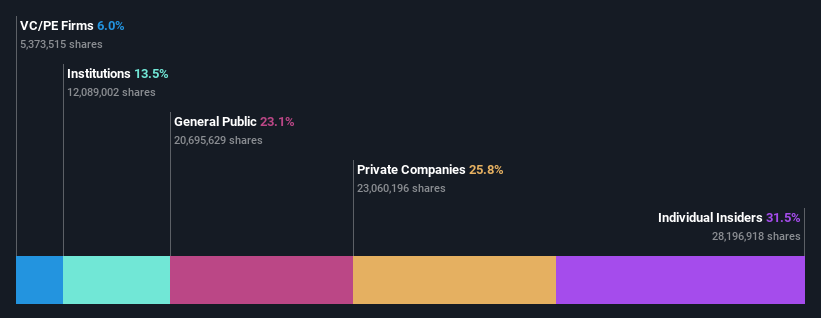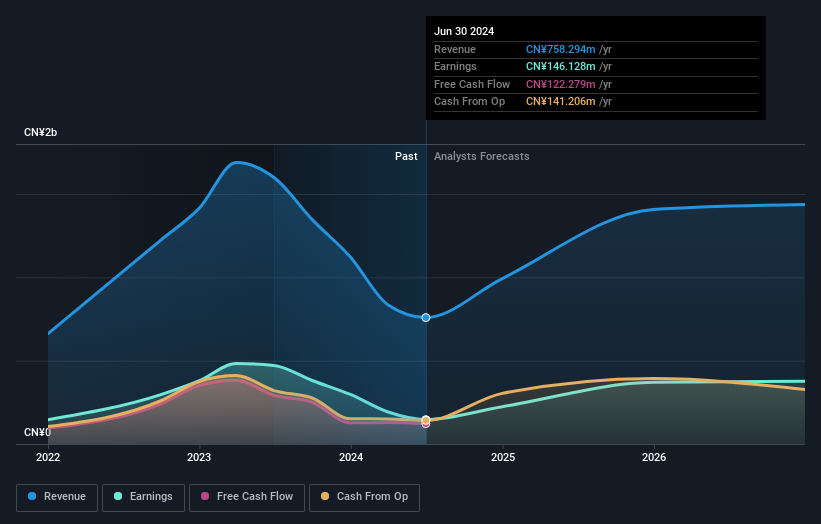- China
- /
- Medical Equipment
- /
- SZSE:301367
BMC Medical Co., Ltd.'s (SZSE:301367) most bullish insider is CEO Zhi Zhuang, and their holdings value went up by 13% last week

Key Insights
- BMC Medical's significant insider ownership suggests inherent interests in company's expansion
- A total of 6 investors have a majority stake in the company with 55% ownership
- Institutions own 14% of BMC Medical
If you want to know who really controls BMC Medical Co., Ltd. (SZSE:301367), then you'll have to look at the makeup of its share registry. The group holding the most number of shares in the company, around 32% to be precise, is individual insiders. That is, the group stands to benefit the most if the stock rises (or lose the most if there is a downturn).
As a result, insiders were the biggest beneficiaries of last week’s 13% gain.
Let's take a closer look to see what the different types of shareholders can tell us about BMC Medical.
View our latest analysis for BMC Medical

What Does The Institutional Ownership Tell Us About BMC Medical?
Institutional investors commonly compare their own returns to the returns of a commonly followed index. So they generally do consider buying larger companies that are included in the relevant benchmark index.
As you can see, institutional investors have a fair amount of stake in BMC Medical. This suggests some credibility amongst professional investors. But we can't rely on that fact alone since institutions make bad investments sometimes, just like everyone does. When multiple institutions own a stock, there's always a risk that they are in a 'crowded trade'. When such a trade goes wrong, multiple parties may compete to sell stock fast. This risk is higher in a company without a history of growth. You can see BMC Medical's historic earnings and revenue below, but keep in mind there's always more to the story.

We note that hedge funds don't have a meaningful investment in BMC Medical. Looking at our data, we can see that the largest shareholder is the CEO Zhi Zhuang with 13% of shares outstanding. With 12% and 9.3% of the shares outstanding respectively, Zhuhai Hexuan Investment Center (Limited Partnership) and Bei Chen are the second and third largest shareholders. Interestingly, the third-largest shareholder, Bei Chen is also a Member of the Board of Directors, again, indicating strong insider ownership amongst the company's top shareholders.
We also observed that the top 6 shareholders account for more than half of the share register, with a few smaller shareholders to balance the interests of the larger ones to a certain extent.
While studying institutional ownership for a company can add value to your research, it is also a good practice to research analyst recommendations to get a deeper understand of a stock's expected performance. There are a reasonable number of analysts covering the stock, so it might be useful to find out their aggregate view on the future.
Insider Ownership Of BMC Medical
While the precise definition of an insider can be subjective, almost everyone considers board members to be insiders. Company management run the business, but the CEO will answer to the board, even if he or she is a member of it.
Insider ownership is positive when it signals leadership are thinking like the true owners of the company. However, high insider ownership can also give immense power to a small group within the company. This can be negative in some circumstances.
Our information suggests that insiders maintain a significant holding in BMC Medical Co., Ltd.. Insiders own CN¥2.3b worth of shares in the CN¥7.1b company. That's quite meaningful. It is good to see this level of investment. You can check here to see if those insiders have been buying recently.
General Public Ownership
With a 23% ownership, the general public, mostly comprising of individual investors, have some degree of sway over BMC Medical. While this size of ownership may not be enough to sway a policy decision in their favour, they can still make a collective impact on company policies.
Private Equity Ownership
With an ownership of 6.0%, private equity firms are in a position to play a role in shaping corporate strategy with a focus on value creation. Sometimes we see private equity stick around for the long term, but generally speaking they have a shorter investment horizon and -- as the name suggests -- don't invest in public companies much. After some time they may look to sell and redeploy capital elsewhere.
Private Company Ownership
It seems that Private Companies own 26%, of the BMC Medical stock. It's hard to draw any conclusions from this fact alone, so its worth looking into who owns those private companies. Sometimes insiders or other related parties have an interest in shares in a public company through a separate private company.
Next Steps:
While it is well worth considering the different groups that own a company, there are other factors that are even more important. Case in point: We've spotted 2 warning signs for BMC Medical you should be aware of.
If you are like me, you may want to think about whether this company will grow or shrink. Luckily, you can check this free report showing analyst forecasts for its future.
NB: Figures in this article are calculated using data from the last twelve months, which refer to the 12-month period ending on the last date of the month the financial statement is dated. This may not be consistent with full year annual report figures.
Valuation is complex, but we're here to simplify it.
Discover if BMC Medical might be undervalued or overvalued with our detailed analysis, featuring fair value estimates, potential risks, dividends, insider trades, and its financial condition.
Access Free AnalysisHave feedback on this article? Concerned about the content? Get in touch with us directly. Alternatively, email editorial-team (at) simplywallst.com.
This article by Simply Wall St is general in nature. We provide commentary based on historical data and analyst forecasts only using an unbiased methodology and our articles are not intended to be financial advice. It does not constitute a recommendation to buy or sell any stock, and does not take account of your objectives, or your financial situation. We aim to bring you long-term focused analysis driven by fundamental data. Note that our analysis may not factor in the latest price-sensitive company announcements or qualitative material. Simply Wall St has no position in any stocks mentioned.
About SZSE:301367
BMC Medical
Develops, manufactures, and supplies medical equipment and consumable in the field of respiratory health in China.
Flawless balance sheet with high growth potential.


